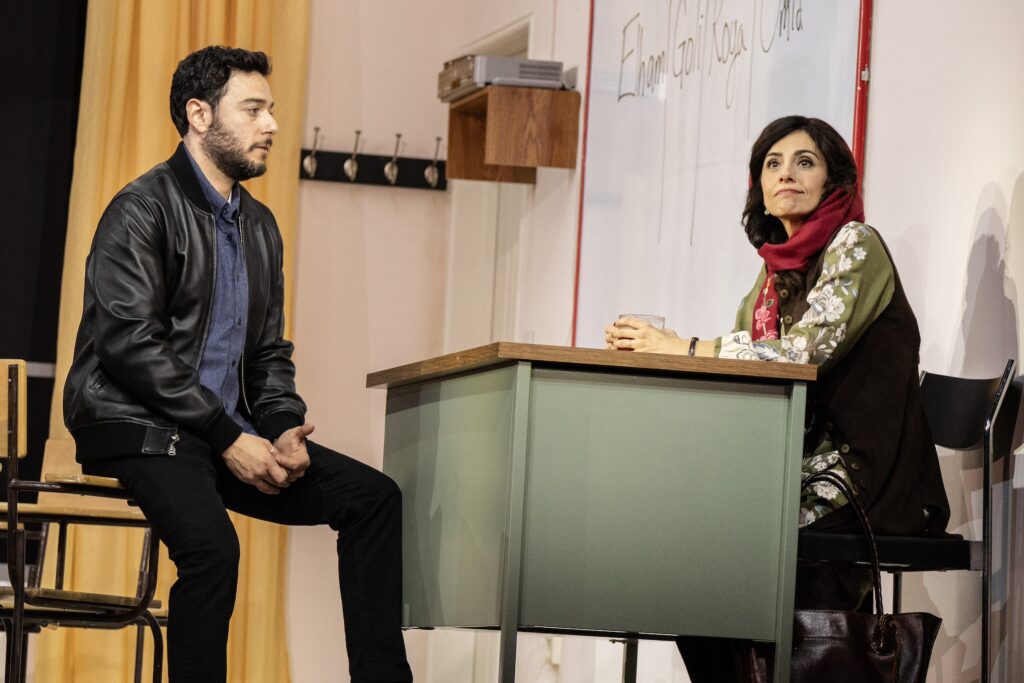Set in Iran, Sanaz Toossi’s ‘English’ Is More a Study of the Power of Language Than of Geopolitics
With independent-minded Iranian women facing ever greater challenges, and dangers, Toossi is to be credited for giving them voices that are graceful and awkward, funny and fierce.

The first thing one is likely to notice about the four women introduced in Sanaz Toossi’s “English,” now making its Broadway debut, is their accents. Ms. Toossi’s play, set inside a classroom at the Iranian city of Karaj in 2008, is performed almost entirely in its titular language, but the actors speak unaccented English only when their characters are meant to be communicating in Farsi, their native tongue.
Yet what may be most striking about “English,” which was first produced in New York in 2022 and won the Pulitzer Prize for drama the following year, is what it’s not. Ms. Toossi, the daughter of Iranian immigrants, doesn’t focus specifically on the geopolitical drama or humanitarian struggles that people living in Iran have dealt with since the Islamic revolution of 1979.
“English” is, instead, a study of how language, with its inextricable attachment to nationality and/or culture, can empower, weaken, and divide us. Participating in a course designed for advanced learners of English, Ms. Toossi’s characters, who also include a man — his accent is more subtle, for reasons that become clear later in the play — are pressed to ask how expressing themselves in a foreign language can undermine not only their authority but their authenticity.
Some grapple with this conflict more openly than others. Marjan, the teacher, played by an elegant Marjan Neshat, spent nearly a decade living among Brits in Manchester; she advises her students, “English is not to be conquered. Embrace it. You can be all the things you are in Farsi in English, too.” She even confesses: “I always liked myself better in English.”

Marjan’s youngest pupil, a wide-eyed teenager named Goli, whose naivete and enthusiasm are conveyed adorably by Ava Lalezarzadeh, is her most eager convert, though her reasoning raises questions. “English does not want to be poetry like Farsi,” Goli asserts. “It is like some rice … you make the rice whatever you want.”
The eldest in the group, Roya, is more ambivalent; she’s taking the class so that she can be prepared to join her son and granddaughter in Canada. Elham, who wants to attend medical school in Australia, passed her entrance exams in English with flying colors, but has failed the standard test in English as a foreign language five times. “English isn’t your enemy,” Marjan tells her. “It is feeling like yes,” Elham retorts.
Then there’s Omid, the sole male character, whose very presence reminds us that this isn’t a foreign language class in Australia or Canada or England, or any other country not under Islamic rule. Played by Hadi Tabbal with a deft balance of superficial earnestness and subtle guile, he’s an enigma — his English is somehow good enough to encompass terms like “windbreaker” — and something of an irritant for the female students, particularly Elham, who marks him as a teacher’s pet.
Elham isn’t wrong. In fact, the rapport between Omid and Marjan quickly develops a flirtatious edge, with the two lingering after class to watch American movies and chat. Marjan reveals more about herself — we learn that her husband doesn’t speak English, and that their daughter is a Julia Roberts fan — but also remains something of a mystery, not saying more about her marriage, or why she returned home from the U.K. despite her infatuation with its language.
If both characters, the teacher and her male pupil, and the relationship between them emerge as somewhat underdeveloped, Ms. Toossi adds more flesh to others. We see how Roya, given a gentle dignity by Pooya Mohseni, is hurt by her son’s obvious determination to not let his mother threaten his assimilation, and Tala Ashe conveys the vulnerability and wounded pride behind Elham’s defensive, sometimes rude behavior.
Director Knud Adams mines the ample humor sprinkled throughout the dialogue; even the incidental piano music, while often pensive, can become sprightly at points. The conversation, in tone and subject, can seem as familiar as it would between contemporary Western characters; Elham, in one of her bursts of sarcasm, makes an off-color sexual reference.
Of course, anyone who’s kept track of international news since “English” first arrived in this city three years ago knows that independent-minded Iranian women face ever greater challenges, and dangers, today. Ms. Toossi is to be credited for giving them voices that are graceful and awkward, funny and fierce — that is, deeply, irrepressibly human.

